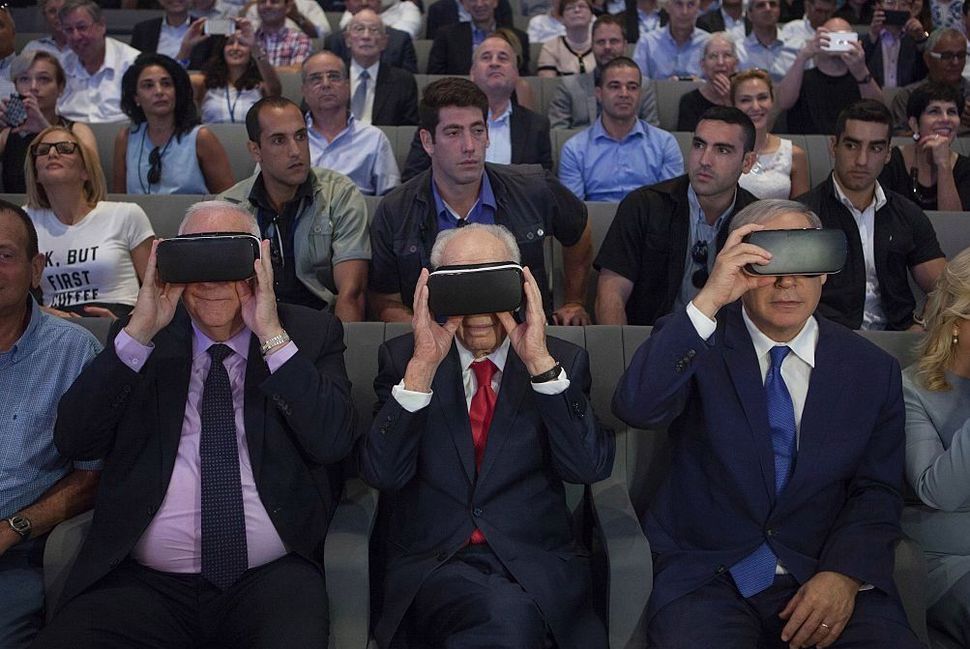Want Peace Between Israel And The Arab States? Tech May Be The Key

Image by Getty Images
As the late Shimon Peres argued in his book The New Middle East, peace in the Middle East will not come without economic cooperation between Israel and the Arab states. The supposed talks between Israel and Saudi Arabia about establishing economic relations is the latest attempt to promote peace in the region through such an initiative. Since I studied abroad at the University of Haifa a couple of years ago, I have been advocating why Israel’s Arab citizens need to be the leaders in promoting economic cooperation between Israel and the Arab states.
One of the main themes I have observed in my first year in the workforce is the value of communication. Linguistic and cultural barriers between coworkers and coworkers and their clients often create miscommunication and impede businesses’ success. Israel and the Arab states certainly possess these barriers. Thus, Israel’s Arab citizens, with their linguistic and cultural skills, are perfectly suited to promote economic cooperation between Israel and the Arab states through entrepreneurship, and now the time may be ripe.
A recent analysis on Israel’s Central Bureau of Statistics revealed how Israel’s Arab citizens are going through a “middle class revolution” and are eager to contribute to Israeli society. More and more Israeli Arabs are investing in higher living standards for their children through higher education and finding jobs in the high-tech field. Given the vibrancy of Israel’s start-up nation, one would assume Israeli Arabs could easily find jobs in the high-tech industry. Unfortunately, however, Israeli Arabs are not as well integrated into Israel’s Silicon Wadi as their Israeli Jewish counterparts are.
Due to a lack of networking, the vast majority of Israeli Arab graduates with science and engineering degrees do not find jobs in the high-tech industry. As Dan Senor and Saul Singer explain in their book Start-Up Nation, “because they (Arabs) are not drafted into the army…they are less likely to develop the entrepreneurial and improvisations skills that the IDF inculcates…they also do not develop the business networks that young Israeli Jews build while serving in the military.” For instance, last year, a survey conducted by MasaUp found that only 40% of Israeli Arabs have encountered start-ups opposed to 90% of Israeli Jews. Additionally, only 20% of Israeli Arabs know someone in a startup company.
Israel’s Arab citizens could alternatively find the skill development and networking they need through Israel’s national service program. However, a 2011 study by Israeli sociologist Sammy Smooha revealed that only 41.6% of Arabs said they feel they receive sufficient information about the potential benefits of participation and 75% of those who do participate do not come into contact with their Israeli Jewish counterparts who could help them get the connections they need. In addition, Israeli Arab leaders in the Knesset have discouraged Arab participation in Israel’s national service program. Fortunately, things are beginning to change.
The Israeli government and Israeli Arab leaders have taken initiatives to help integrate Israel’s Arab citizens into the high-tech field. Since 2012, the government has launched and backed multiple programs that help with the recruitment and development of Israeli Arab entrepreneurs. We have even seen the establishment of the first Arab high-tech school in Kafr Qassem.
More Arabs are also choosing to participate in Israeli national service. In 2010, only 600 non-Jews participated in national service. Today it is over 4,500, and 85% of Arabs who participate say it helps them find good jobs. Moreover, in March, Israeli Arab leaders endorsed volunteering in Arab localities. Though it is still separate from Israel’s official national service program, participants essentially do the same work.
Arab representatives in the Knesset must eventually endorse Israel’s national service program, as that will help Israel’s Arab citizens get in contact with their Israeli Jewish counterparts. Nevertheless, though both need to do their parts, slightly more emphasis should be put on the Israeli government. As Head of Givat Haviva Mohammad Darawshe has argued, the Israeli government has the power to integrate Israeli Arabs by connecting roads and adding advertisements in newspapers.
Israel cannot miss this unique opportunity it has to connect itself with the Arab world and let their Arab citizens’ talents go to waste. By further integrating Israel’s Arab citizens into the high-tech industry, Israeli Arabs will be able to open markets in the neighboring Arab states and help create a more peaceful environment in the region.

















